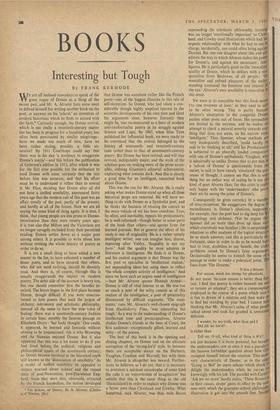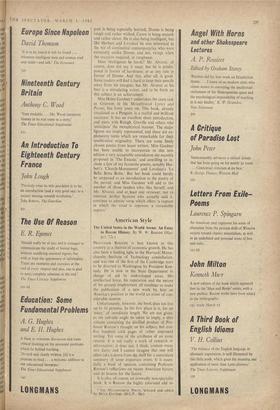BOOKS
Interesting but Tough
By FRANK KERMODE
WE are all inclined nowadays to speak of the great vogue of Donne as a thing of the recent past, and Mr. A. Alvarez feels some need
to defend himself for writing another book on the poet, or anyway on his 'school,' an invention of modern historians which he finds to accord with the facts.* Curiously enough, the Donne revival, which is not really a twentieth-century matter but has been in progress for a hundred years, has often been punctuated by similar misgivings: have we made too much of him; have we been rather daring, possibly a little ex- cessive? By 1911 Courthope could say that there was in his day 'a tendency to exaggerate Donne's merits'—and this before the publication of Grierson's edition in 1912, after which it was for the first time possible for the enthusiast to read Donne with some certainty that the text before him was accurate, and that his effort must be to understand it rather than to emend it. Mr. Eliot, deciding that Donne after all did not have a unified sensibility, announced thirty years ago that the modern cult of this poet was an affair mostly of the past, partly of the present, and hardly at all of the future. Now we are all saying the same kind of thing again. It is true, I think, that young people are less prone to Donne- intoxication than they were twenty years ago; it is true also that Milton and the Victorians are no longer savagely excluded from their permitted reading. Donne settles down as a major poet among others. It is possible to write about him without revising the whole history of poetry in order to do so.
It is not a small thing to have added a new master to the list, to have exhumed a number of lesser poets, and to have ensured that others, who did not need reviving, should be decently read. And there is, of course, (though this is usually exaggerated) the impact on modern poetry. The debit side of the account is heavy too, but one should remember first the benefits re- ceived. The boom began in the first place because Donne, though difficult if you were unaccus- tomed to love poems that used the jargon of alchemy, astronomy and scholastic philosophy, seemed all the same to have the true voice of feeling; there was a nineteenth-century fashion in certain lines, notably the famous passage on Elizabeth Drury : ter body thought.' One could, it appeared, be learned and fantastic without ceasing to be impassioned; this is why Browning and the Nineties enjoyed Donne. But it also appeared that this was a lot easier to do if you had lived beforet the political, religious and philosophical upsets of the seventeenth century; so Donne became involved in the historical myth still known as the 'dissociation of sensibility.' As a model of unified sensibility he appealed to writers worried about science, and the ruined state of post-Newtonian, post-Darwinian Eng- land. Since they were also, obviously, attracted by the French Symbolists, the notion developed * Tut SCHOOL op DONNE. By A. Alvarez. (Chatto Windus, 18s.) that Donne was somehow rather like the French poets—one of the biggest illusions in this tale of self-deception. So Donne, who had taken a con- siderable though highly sceptical interest in the scientific developments of his own time and liked his arguments clear, however fantastic they might be, was reconstructed as a hero of modern anti-intellectualist poetry in its struggle against Science and Logic. By 1947, when Miss Tuve published her influential book, we were ready to be convinced that the revival belonged to the history of nineteenth- and twentieth-century taste rather than to that of seventeenth-century poetry. But Donne has been revived, and will stay revived, indisputably major, and the work of the scholars goes on, making more of the prose acces- sible, refining Grierson's editorial achievement, explaining what remains dark. And this is clearly a good time for an intelligent, unexcited book about Donne.
This was the cue for Mr. Alvarez. He is really asking what makes Donne stand up when all these historical props are removed. He will have no- thing to do with Donne as a Symbolist poet, and he thinks the business of treating the conceit as the main vehicle of wit has been overdone. True, he often, and inevitably, repeats his predecessors; he is well-informed—though better in some parts of the book than others—and quotes from the learned journals. But in general the effect of his study is one of originality. He is a rather tensely intelligent writer; one can imagine him, almost, repeating after Valery, 'Stupidity is not my forte.' And the quality he most admires in literature is intelligence. He finds it in Donne, and his central argument is that Donne was the first poet to specialise in 'intellectual realism,' not expounding ideas but using them to reflect 'the whole complex activity of intelligence.' And since we have such an urgent need of intelligence —here Mr. Alvarez quotes Hannah Arendt— Donne is still of vital interest to us. He was not so much a poet of the witty conceit as of this realism of the intelligence, a poet of personality illuminated by difficult argument. 'The state- ments,' runs Mr. Alvarez's well-chosen epigraph from Huckleberry Finn, 'was interesting but tough.' As a way to the understanding of Donne's
intellectual tone and preoccupations, Alvarez studies Donne's friends at the Inns of Court, the first audience—exceptionally gifted, learned and witty—of the poems.
The best of this book is in the opening and closing chapters, on Donne and on the ultimate corruption of the `strong-lin'd' style. In between there are acceptable essays on the Herberts, Vaughan, Crashaw and Marvell; but with them Mr. Alvarez is altogether less inward. Further- more he believes, as I do not, that it is necessary to postulate a spiritual catastrophe of some kind (he calls it an 'extroversion of imagination' but admits that this is the same thing as the old 'dissociation') in order to explain why Donne was a better poet than Cleveland and Cowley. What happened, says Alvarez, was that, with Bacon
superseding the scholastic philosophy, learning was no longer 'emotionally important' to Cleve land, and Cowley used illustrations which had '00 organic relationship' with what he had to say (3 charge, incidentally, one could often bring against( Donne). But one can disagree about this and still admire the way in which Alvarez makes his points for Donne's, and against his successors', intel:! ligence. He is particularly good on the 'masculine quality of Donne, which he defines with a neat' quotation from Benlowes, of all people: 'the! masculine and refined pleasures of the under.,, standing transcend the feminine and sensual off the eye.' Alvarez's own sensibility is masculine in' this sense.
Yet even at its masculine best this book seems ('to one reviewer at least,' as they used to say) to be often wrong. This is partly because Alvarez's absorption in the congenial Donna pushes other poets out of focus. His sympathies are limited in the extreme, and be makes no attempt to check a natural severity towards anr thing that does not seem, on his narrow view. `intelligent.' Thus Spenser, whose methods are very inadequately described, 'could hardly be said to be thinking at all,' and his Frotha/amiorl is subjected to an absurdly loaded comparison with one of Donne's epithalamia. Vaughan, who is admittedly so unlike Donne that to put him la a 'school of Donne' is questionable from the outset, is said to have merely 'simulated' the pro' cesses of thought. I cannot see that this is any' thing but an unfair way of saying he is not the kind of poet Alvarez likes; for this critic is reallY only happy with the 'understanders' who prove their wit by seeing the point of Donne's.
Consequently he gives currency to a number of misconceptions. He exaggerates the degree of reconditeness in Donne's allusions, supposig for example, that the poet had to dig deep for PI angelology and alchemy. (Yet he argues that Spenser did no more than dress up ideas with which everybody was familiar.) He is surprisinglY reluctant to offer analyses of the logical structure he so much admires; and this is particularly or fortunate, since in order to do so he would have had to treat, doubtless to our benefit, the trickY problems raised by Donne's false argument; Occasionally he seems to wrench the sense Or 3 passage in order to make a polemical point. ftie lines from 'The Dreame,' It was a (beanie
For reason, much too strong for phantasie.
do not mean 'because reason is better than fan' tasy, I find that poetry is rather beneath me and so remain an amateur'; they are a commonplace employed in the course of a poem which says II is fun to dream of a mistress and then wake uP to find her standing by your bed. I cannot hell' thinking that Mr. Alvarez's sense of what people talked about and took for granted is sometimes deficient.
wonder, by my troth, what thou and I Did till we lov'd?
is richer than
Tell me, 0 tell, what kind of thing is Wit?
not just because it is more personal, but beemil the understanders saw at once it was a parody °, the famous forbidden question about how (-30", occupied himself before the creation. This seen' very characteristic of Donne; as in the cid' 'Going to Bed' he starts echoes which shock c'f delight the understanders while he carries °,I1 knowingly with his job. The parallel with Cal 'Ask me no more' hardly exists; 'These flowers 34 in their causes, sleepe' gains its effect by the neat' ness with which the grammar-school philosophy' illustration is got into the smooth line. Neither
poet is being especially learned; Donne is being rough and rather wicked, Carew is being smooth and rather clever. He is also being intelligent, but like Herbert and Lovelace he was interested in the wit of continental contemporaries who were extremely unlike Donne, and not, except when the occasion required, in roughness.
Must intelligence be harsh? Mr. Alvarez. of course, does not say it must; but he is predis- posed in favour of harshness; or at any rate in favour of Donne. And this, after all, is good. Some readers will find it hard to keep their pencils away froM his margins; but Mr. Alvarez at his best is a stimulating writer, and to be fresh on this subject is an achievement.
Miss Helen Gardnert undertakes the same task as Grierson in his Metaphysical Lyrics and Poems, but forty years on. This book, already circulated as a Penguin, is a tactful and brilliant successor. It has an excellent short introduction, and starts with Ralegh, Greville and others who 'anticipate' the metaphysical manner. The major figures are amply represented, and there are ex- planatory notes which are remarkable for their unobtrusive originality. There are some finely chosen poems from lesser writers. Miss Gardner has been unable to incorporate in this new edition a very acceptable emendation she recently proposed in 'The Extasie,' and unwilling to in- clude a few of my favourite poems, notably Her- bert's 'Church-Monuments' and Lovelace's `La Bella Bona Roba.' But her book could hardly be surpassed as an introduction to the poetry of the period; and Miss Gardner will add to the number of those readers who, like herself, and Mr. Alvarez, and at_least one reviewer, not to mention Arthur Symons who actually said it. continue to admire verse which offers 'a rapture in which the mind is supreme, a reasonable rapt u re.'







































 Previous page
Previous page